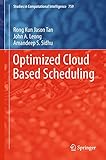Optimized Cloud Based Scheduling [electronic resource] / by Rong Kun Jason Tan, John A. Leong, Amandeep S. Sidhu.
By: Tan, Rong Kun Jason [author.] .
.
Contributor(s): Leong, John A [author.] | Sidhu, Amandeep S [author.]
| Sidhu, Amandeep S [author.] | SpringerLink (Online service)
| SpringerLink (Online service) .
.
Material type:  BookSeries: Data, Semantics and Cloud Computing: 759Publisher: Cham : Springer International Publishing : Imprint: Springer, 2018Edition: 1st ed. 2018.Description: XIII, 99 p. 33 illus. online resource.Content type: text Media type: computer Carrier type: online resourceISBN: 9783319732145.Subject(s): Computational intelligence
BookSeries: Data, Semantics and Cloud Computing: 759Publisher: Cham : Springer International Publishing : Imprint: Springer, 2018Edition: 1st ed. 2018.Description: XIII, 99 p. 33 illus. online resource.Content type: text Media type: computer Carrier type: online resourceISBN: 9783319732145.Subject(s): Computational intelligenceIntroduction -- Background -- Benchmarking -- Computation of Large Datasets -- Optimized Online Scheduling Algorithms.
This book presents an improved design for service provisioning and allocation models that are validated through running genome sequence assembly tasks in a hybrid cloud environment. It proposes approaches for addressing scheduling and performance issues in big data analytics and showcases new algorithms for hybrid cloud scheduling. Scientific sectors such as bioinformatics, astronomy, high-energy physics, and Earth science are generating a tremendous flow of data, commonly known as big data. In the context of growing demand for big data analytics, cloud computing offers an ideal platform for processing big data tasks due to its flexible scalability and adaptability. However, there are numerous problems associated with the current service provisioning and allocation models, such as inefficient scheduling algorithms, overloaded memory overheads, excessive node delays and improper error handling of tasks, all of which need to be addressed to enhance the performance of big data analytics.


There are no comments for this item.